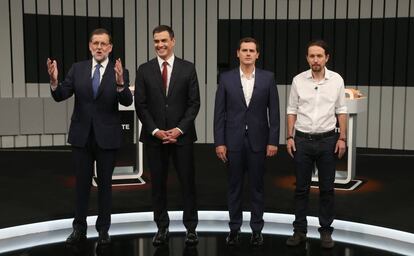The uncertainty continues
Monday’s four-way debate did nothing to clarify the main parties’ plans for office after June 26 elections

As with other televised debates in Spain between prime ministerial aspirants, Monday’s event, attended by the leaders of the four main parties was not exactly a debate as such: rather it was a performance in which the quartet consented to the presence of three journalists as referees and timekeepers, rather than as genuine interlocutors on behalf of the electorate. Beyond the novelty of a four-way discussion, this first, and sadly last, televised debate simply didn’t cut the mustard, given that 10.5 million people stayed up late to watch it.
Acting prime minister Mariano Rajoy and Pablo Iglesias, the leader of anti-austerity party Podemos, gave the impression that they were both more concerned about not alienating the people who voted for them on December 20 rather than winning the debate. This somewhat reserved approach certainly benefitted Mariano Rajoy, who highlighted his achievements over the course of two terms in office as a guarantee to created two million jobs, insisting on this several times, prompting one of the journalists to question how believable this promise was (as has EL PAÍS).
Socialist Party (PSOE) leader Pedro Sánchez took a more aggressive approach, but this was diluted by having to divide his attacks alternately between Rajoy and Iglesias. He was hard on Rajoy, and also on Iglesias, criticizing his lack of support in opposition during the last four years. But just what it is that the Socialists would do in office, and who they would ally themselves to do so after the elections on June 26, remained unclear when the program ended.
Pablo Iglesias and Albert Rivera, who for the first time met their rivals from the two parties that have dominated Spanish politics over the last four decades in public on an equal footing, each took a very different approach: Rivera was more pugnacious in challenging Rajoy and Iglesias, while Iglesias, heading a coalition with the Communist Party-led United Left, was more interested in highlighting Sánchez’s hostility toward Podemos while reaching out to the PSOE to form a broad-left government than in wearing Rajoy down over the myriad corruption scandals that have hit the Popular Party (PP).
The limitations of the program’s format were evident. We have said from the start that a single debate between the four candidates for prime minister would not be sufficient to cover the many questions that need to be addressed: this was manifest on Monday night. Many important issues were barely touched on or discussed in the briefest of terms: Spain’s place in Europe and the rest of the world merited a few minutes in the closing stages of the debate, by now past midnight.
Nothing that was said shed any light on what was going to happen the day after the elections. Nobody gave the impression that that had a well-thought out plan able to tip the vote in one direction or another or to provide a viable government after six months of impasse. The possibility alone that a third general election might be necessary should surely be a serious enough prospect as to prompt the four parties to lay out once and for just what it is they propose to do if they win office.
English version by Nick Lyne.
Tu suscripción se está usando en otro dispositivo
¿Quieres añadir otro usuario a tu suscripción?
Si continúas leyendo en este dispositivo, no se podrá leer en el otro.
FlechaTu suscripción se está usando en otro dispositivo y solo puedes acceder a EL PAÍS desde un dispositivo a la vez.
Si quieres compartir tu cuenta, cambia tu suscripción a la modalidad Premium, así podrás añadir otro usuario. Cada uno accederá con su propia cuenta de email, lo que os permitirá personalizar vuestra experiencia en EL PAÍS.
¿Tienes una suscripción de empresa? Accede aquí para contratar más cuentas.
En el caso de no saber quién está usando tu cuenta, te recomendamos cambiar tu contraseña aquí.
Si decides continuar compartiendo tu cuenta, este mensaje se mostrará en tu dispositivo y en el de la otra persona que está usando tu cuenta de forma indefinida, afectando a tu experiencia de lectura. Puedes consultar aquí los términos y condiciones de la suscripción digital.








































